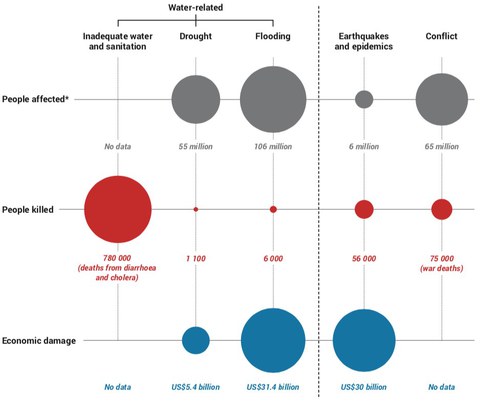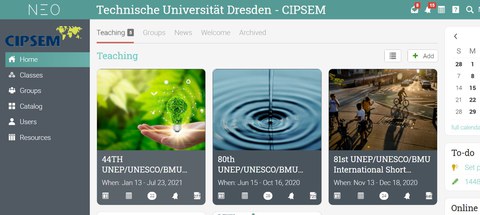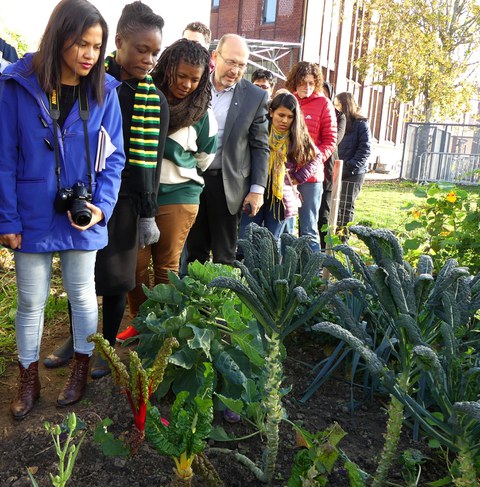82nd UNEP/UNESCO/BMU International Short Course on Integrated Water Resources Management
Duration: 06 September - 15 October 2021 (Online Course)
Relevance
Already over two billion people are living in countries affected by high drought stress or water shortages. About 4 billion people experience severe water shortages during at least one month per year. The water demand will continue to increase by around 1% per year in the coming decades. Agriculture is already responsible for 69% of water abstraction globally. There is also a significant and growing need in industry and energy production. An increase in demand is brought about by population growth, socio-economic development and the associated expansion of urban water supply and sanitation systems. Concerning clean and permanently and easily accessible drinking water and sanitary facilities, there are considerable differences between and within continents, countries, municipalities and even city districts.
Climate change is likely to increase the mismatch between water supply and demand in the future. The frequency and intensity of flood and drought events are expected to change, with drastic effects on socio-economic conditions and the environment. Water quality continues to decrease due to the discharge of polluted wastewater and thus increases water scarcity, endangers human health and pollutes ecosystems, and hinders sustainable development of the economy. Affordable supply and disposal options are urgently sought. A large part of the wastewater is currently discharged untreated worldwide. Improved wastewater management in the sense of a more circular economy holds great opportunities that must be exploited due to the increasing pressure on water resources.
To leave no one behind, the 2030 Agenda for Sustainable Development pursues comprehensive goals to protect the planet from degradation while sustainably managing its resources. Sustainable Development Goal (SDG) 6 is intended to ensure "availability and sustainable management of water and sanitation for all". SDG target 6.3, target 3.9 and target 12.4 especially focus on improved water quality and reducing pollution.
Achieving Goal 6 is central to the overall agenda. The United Nations (UN) considers clean water and sanitation facilities as “basic human rights”. In this sense, we must acknowledge the interconnected dynamic between Goal 6 targets and every other Goal. On the one hand, progress on SDG 6 will, for instance, improve health and reduce the risk of water-borne diseases (SDG 3). On the other hand, the achievement of other SDGs, for example, SDG 12 or SDG 15, is also essential to accomplish SDG 6. Thus, these interlinkages must be well understood and managed to achieve the social, economic and environmental dimensions of the 2030 Agenda. Lacking access to such resources and conditions hinders people having an equal chance to be healthy, educated and financially secure. Central steps for achieving SDG 6 are, therefore, to be taken in countries with low and lower-middle incomes, where the share of water treatment and wastewater treatment is meagre. Thus, the need for cost-effective implementation solutions and safe water use options is exceptionally high in those countries.

Fig. 1: Average annual impacts of inadequate drinking water supply and sanitation, water related disasters, epidemics and earthquakes, and conflicts (Source: World Water Development Report 2019, Adapted from PBL Netherlands Environmental Assessment Agency (2018, p. 14). Licensed under Creative Commons Attribution 3.0 Unported (CC BY 3.0).)
Course concept and objectives
In line with SDG 6 of the 2030 Agenda for Sustainable Development, the course contributes to building up capacities to protect, monitor and clean up available water resources in their local environment. The advanced training course addresses aspects of water quality and quantity with an integrated water resource management approach. Adequate legal provisions, robust political requirements and suitable technologies are considered.
Course emphases include a sound understanding of the hydrologic cycle, incorporating natural and anthropogenic processes, and integrated, inter-sectoral measures for sustainable water resource use that protects human health and the environment.

NEO: the CIPSEM platform for online courses
The online course program includes lectures, seminars, practical exercises, and discussions on topics such as the water cycle, global and urban water (water infrastructure, water treatment, and wastewater treatment), integrated water resource management, climate change and governance frameworks, gender equality and stakeholder participation, waterborne diseases and monitoring systems. The training also considers the sustainable use of wastewater and managed aquifer recharge. After completing the short course, participants should be able to actively contribute to the protection and improvement of water resources in their home countries. Successful participants are awarded a Certificate of Proficiency in Integrated Water Resources Management.
Target groups
This course is aimed at management experts who prepare and implement political decisions and practical measures in ministries, authorities, local government and non-governmental institutions of developing countries (including newly industrialised economies) working on the protection of water resources.

Impression from the previous training
We expect a high motivation to explore concepts for integrated water resource management and work towards implementing them. A first university degree (e.g. BA, BSc) in a related field (e.g. geology, geography, hydrology, meteorology, hydraulic engineering, planning, water management, environmental sciences) is essential. Adequate communication skills in the English language and the nomination by the delegating institution are mandatory.
Supported by

